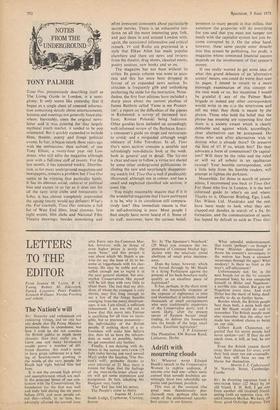TONY PALMER
Time Out, pretentiously describing itself as The Living Guide to London, is a semi- glossy. It only seems like yesterday that it began as a single sheet of roneoed informa- tion containing details about entertainments, lectures and meetings not generally listed else- where. Inevitably, since the original news- letter said it was catering for that largely mythical youth market, it tended to he pop orientated. Rut it quickly expanded to include films, theatre, poetry and fringe political events. In fact, it began nearly three years ago with the enthusiasm, then naivetd, of one Tony Elliott, a tweny-four year old Lon- doner, who still edits the magazine although now with a full-time staff of twenty. For the last month, it has appeared weekly. Distribu- tion, as for many underground magazines and newspapers, remains a problem but Time Out seems to be winning that particular battle. It has no obvious social, cultural or political bias and except in so far as it does not list all the tatty strip clubs and restaurants in Soho, it has almost completely superseded the ageing (many would say defunct) What's On. For example, Time Out contains a full list of West End films, local cinemas, late night events, film clubs and National Film Theatre showings, besides stimulating and often irreverent comments about particularly sacred movies. There is an exhaustive run-
down on all the more interesting pop, folk, and jazz dates in and around London with, again, the occasional informative and critical remark. TV and Radio are previewed in a style that Elkan Allen has made popular elsewhere and there are news and reviews from the theatre, drag shows, classical music, poetry sessions, new books and so on.
The magazine has not been without its critics. Its gossip column was none to accu- rate and this has since been dropped in favour of an expanded news section. Its criticism is frequently glib and unthinking preferring the snide for the instructive. None- theless, the first four editions have included a sharp piece about the current phobias of James Baldwin called 'Fame is my Protect- ion'; a report on the difficulties of the gipsies in Richmond; a survey of increased taxi- fares; Roman Polanski being ludicrous. Other goodies have included an exceedingly well-informed review of the Barbican fiasco; a consumer's guide on shops and restaurants to avoid; and a misguided although tough obituary of John Trevelyan. In all. Time Out's news section contains a sensible and refreshingly non-didactic look at the week, both in general and in detail. The lay-out is clear and easy to follow, a virtue not shared by some other underground publications in- cluding the new and surprisingly disappoint- ing weekly ink. Time Out is well if predictably illustrated, although not in colour, and has a small and neglected classified ads section; it costs lop.
You might reasonably inquire that if it is the wonderful magazine that I have portrayed it to be, why is its circulation still compara- tively low? One immediate reason is that its self-advertising is poor. Most people I find simply have never heard of it. Some of its staff, moreover, have the curious belief, common to many people in that milieu, that somehow the grapevine will do everything for you and that you must not tamper too much with the capitalist system lest you be- come corrupted by it. On the other hand, however, these same people enter directly into that system by publishing, for profit, a magazine whose continued financial success depends on the involvement of that system's money.
If one really wanted to get some idea of what this grand delusion of an 'alternative society' means, one could do worse than scan its pages. I intend to return to a more thorough examination of this concept in the next week or so; but meantime 1• would be grateful if any of the Palmer Bash brigade or indeed any other correspondent would write to me c/o the SPECTATOR and tell me what they think is meant by ,the phrase. Those who hold the belief that the phrase has meaning are supposing first that there is a society extant which is clearly definable and against which, accordingly. clear alternatives can be juxtaposed. Do those who seek after alternatives wish to destroy what is already there? Or preserve the best of it? If so, which bits? Do they advocate a form of communism? Or capital- ism? Will there be the rules and the ruled or will we all subsist in an egalitarian swamp? Your humble correspondent, with a little help from his humble readers, will attempt to lighten the darkness.
Meanwhile, for those in search of ammu- nition, I recommend you back to Time Out. For those who live in London, it is the best informed guide to what's on and where. Thanks to it, Observer Briefing, Ego, Look, Des Wilson Ltd, Mandrake and the rest, have been made to look what they arc; clapped-out dandies in search of a fix. In- formation, and the communication of same, has lapsed by default to such as Time Out.


































 Previous page
Previous page